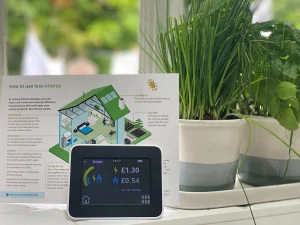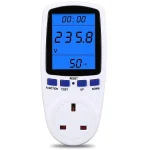In these days of high energy costs, you may wonder how much your fish tank (or tanks) cost to run.
Apart from food and general maintenance costs, the biggest cost of running a fish tank is the cost of the energy needed to power your lighting, heaters, pumps, and other equipment.
It can all soon add up!
Let’s look at how you can measure your fish tank power consumption and how you may be able to reduce it.
Table of Contents

You may already have a smart meter but let’s face it, it’s almost impossible to determine how much a particular household item is costing using a smart meter.
You could try turning everything off except your fish tank I suppose but that’s not really practicable.
Tank Size
Obviously, the size of your fish tank will have a direct bearing on power consumption as a larger tank will require more, or more powerful lights, heaters, and pumps.
That said, the size of your tank should be primarily dependent on the requirements of the fish you wish to keep, not how much it will cost to run.
A small 60-liter fish tank, with a 50-watt heater, 7 – 10 watt LED light, and 5-watt pump/filter adds up to around 60 – 65 watts, but the heater and lights are not on 24 hours, probably half that, giving a total actual usage of around 30 watts.
The typical cost of electricity per kWh is 24.5p* meaning that you pay 24.5 pence for every 1000 watts you use, per hour.
*UK Energy Price Guarantee (Apr 2024)
Using this Electricity cost calculator our small tank costs £0.18 per day to run.
A larger 200-liter tank with a 200-watt heater, 2 x 45-watt LED lights (90 watts), and a 7-watt, 600 lph pump will add up to around 300 watts, but again the heater and lights are not on 24 hours, probably half that, giving a total actual usage of around 150 watts which calculates at £0.88 per day to run.
If you’re thinking of starting a small low-cost tank, check out our articles, Best Saltwater Fish Tank Starter Kit and Best Freshwater Fish Tank Starter Kit.
Lighting
Lighting is probably the most power-hungry of all fish tank equipment, particularly marine aquarium lighting.
However, modern LED lighting is far cheaper to run than older fluorescent or metal halide bulbs.
Most tanks now come with LED lighting but it may not be sufficient for your needs. For example, if you wish to have a heavily planted tank or are keeping corals you will need lighting of a specific spectrum to get the best results.
Heaters
Your fish tank heater is also power-hungry. For a 50-liter tank you’ll need a 50-watt heater, for a 200-liter tank a 150 – 200 watt heater, and so on.
However, your heater will not be on all the time, only switching on when the temperature falls below that set on the heater’s thermostat.
Obviously, in colder months, or overnight, as the temperature around the tank falls the heater will be required to work harder to maintain the water temperature and so consume more power.
You may choose to keep a cold water aquarium, in which case you may have no need for a heater (although one still might be needed in very cold conditions).
Pumps
Modern fish tank pumps (particularly DC pumps) use relatively little power but they are on all the time. A good 600 lph pump may use as little as 7 watts.
You should always choose a pump that is rated for your tank size but it’s easy enough to compare different manufacturer’s pumps against their wattage usage.
Other Equipment
Other equipment that uses power in your fish tanks may include protein skimmers, UV sterilizers, wavemakers and air pumps all being fairly low in consumption.
Ways to Save
Your lights should never be on 24 hours a day as your fish, plants or corals require a day/night cycle just as we do. If your lights are programmable you will set a time for the lights to come on and off.
If not, get a timer plug and use that to automatically turn the lights on and off.
Your lighting cycle should be ‘lights on’ for 8-12 hours but going closer to 8 or even 7 hours will save you money. Plants and corals will be fine with a shorter cycle and, frankly, your fish won’t care at all. A shorter lighting cycle will also help keep nuisance algae at bay.
Your heater may not be required to be on at all during warmer months and if that’s the case where you live you can just remove it. Even turning it down a degree or two will not affect your fish but will save energy over the long term.
Use a temperature controller with your heaters, they are far more accurate than most heater’s built-in thermostats and also protect your tank from any potential heater failures.
Use DC (direct current) pumps and powerheads where possible as these use far less power than AC models.
Always compare different makes and models when choosing equipment for your fish tanks and choose the most energy efficient you can find as you will make big savings in the long run.
Accurately Measure Your Fish Tank Power Consumption
Yes, you can use the Electricity cost calculator to add up the various costs for each item of equipment you are running but there is an easier way.
If all your equipment is run via multi-plug extension leads into one wall socket, just add a power consumption meter to the wall socket first.
Or if you run your power from more than one wall socket, add more power consumption meters and tot up the total.
They are cheap and easy to install with prices around £7 – £15. Check out the link below:-
Power Consumption Meters
 | Power Consumption Meters | Check pricing on eBay >> *Free UK Delivery |
You can easily add your current electricity kWh tariff and read off how much your tank is costing per hour, day, week, month, etc.
